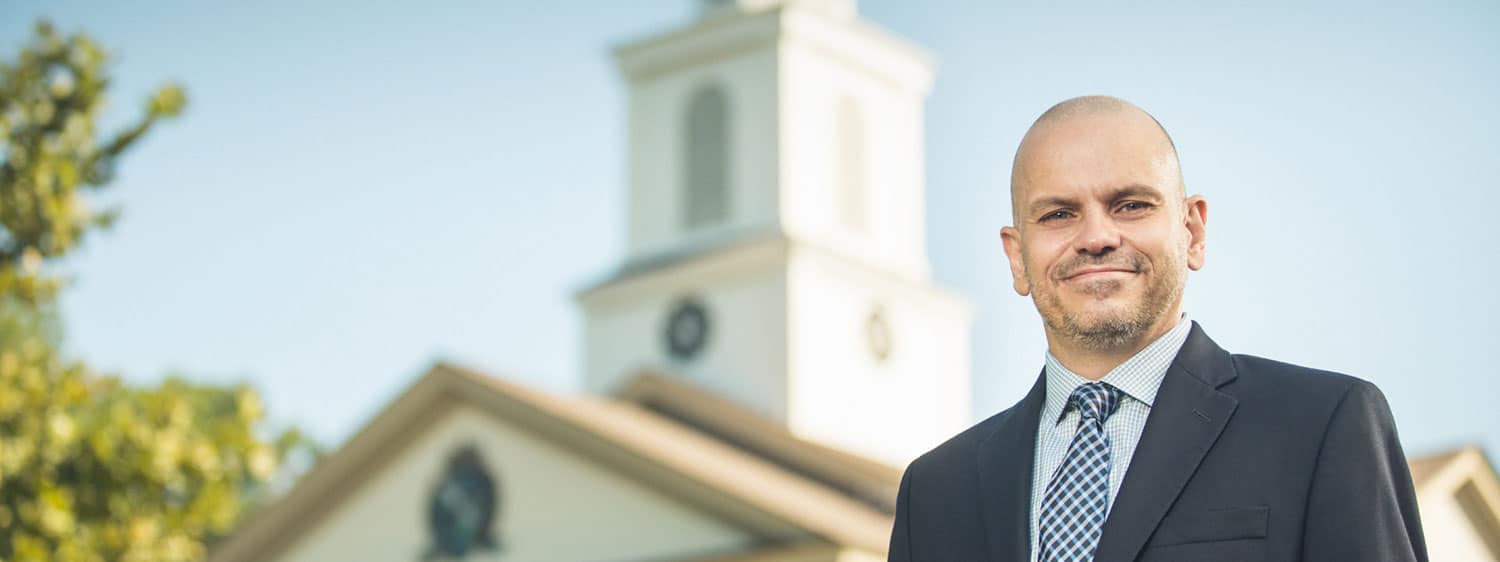
“Before the Face of God”: Dr. Corné Bekker Speaks on the Preeminence of Christ and a Good Christian Death
Amidst the messages of condolence over the death of the late Rev. Billy Graham, on Wednesday, February 21, Regent University School of Divinity Dean Dr. Corné Bekker delivered a message in University Chapel that resonated the selfless dedication Graham epitomized.
“Every journey with God starts with a vision of his holiness,” Bekker said.
Sole Deo Gloria one of the five solas — the five tenants of doctrine the protestant reformation produced — is a Latin phrase translated, “to the glory of God alone.”
Bekker focused on this fifth and final sola in his message titled, “Coram Deo”, a Latin phrase which means “to be before the face of God.” It points believers to the reality that God is not only constantly watching them, but they are also incapable of to escaping from Him in His sovereignty.
It’s this confrontation – of man with God, holy and worthy of glory and worship — that marked the beginning of Bekker’s conversion.
His father, who managed a clinic for people with substance addictions, was an alcoholic himself — an addiction that often spurred the normally “gentle” man into bouts of violence.
One night, Bekker — an adolescent at the time — had to shelter himself in a car outside his family’s house because his father became extremely aggressive.
Bekker said the Lord’s prayer, a piece of liturgy he’d familiarized himself with during numerous Sunday church services. He said it was all he could think of during the ordeal, and repeated it continually as he sat in the car.
“It was at that moment, as I prayed that prayer over and over again, that the car was filled with the very presence of the Lord,” he said. “And when I finally came to the end of that prayer … I made the decision that whether I lived or died that night, all glory would go to Him.”
Not a year later, Bekker’s father also converted. Although he passed a year after that, Bekker said it was a “moment of extraordinary transformation for me because I recognized it was indeed God [who] is in control, and that he is the God of the universe.”
That same dual message is asserted via Coram Deo.
“He’s closer to us than the air around us, but secondly … life is best lived when we focus our eyes on God,” said Bekker. “When He is indeed the one that has preeminence in everything we do.”
In what he referred to as his “second conversion,” Bekker witnessed this utter devotion to Christ as supreme in the ceiling mosaic of a church in Rome he visited on a trip to Italy as a college student. The image featured the piece’s commissioner, Pope Honorius IV, a common artistic touch found in other 13th century works. Unlike other pieces, however, it featured the Pope bowing humbly at the feet of Christ — who was positioned as the eminent figure in the image — a contrastingly humble statement to that of other commissioners from the period, who, according to Bekker, would often have themselves portrayed in far more prominent and far less humble positions.
“As I saw that little man, kneel at the feet of Jesus, the Holy Spirit descended once again,” Bekker said. “And I remember as I stood there … just crying and weeping … and once again, I recognized the call to give God all the glory for the work he’s done in my life and will continue to do.”
We must live to glorify God, Bekker said, and live with integrity — integrated into God’s plan through word and deed — with the reality that our lives are held before Him constantly.
Bekker referenced faithfulness to selfless devotion to Christ as qualities the late Rev. Billy Graham exemplified in his own life.
He recounted his response to a friend who recently asked Bekker, “What are you trusting God for?”
“I am trusting God for a good death,” Bekker said. “I want to die a Christian death. I want to die a death where I have done what God has called me to do. I want to die, finally, a death like Billy Graham — in a holiness and consistency and integrity where there’s no difference between what we say and what we do.”


